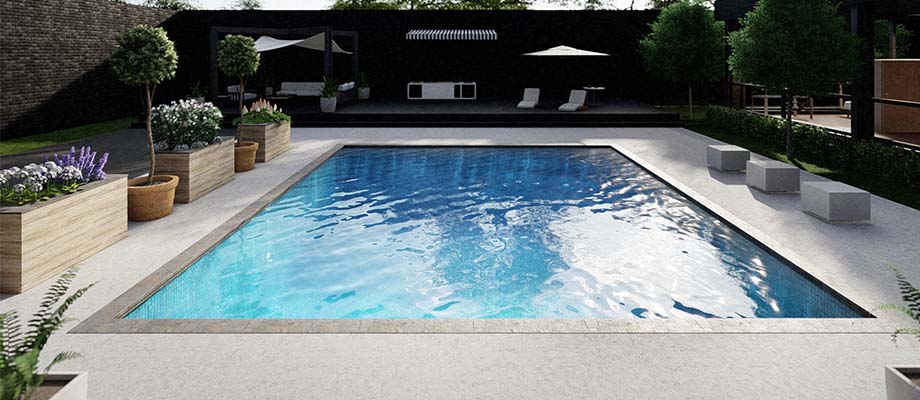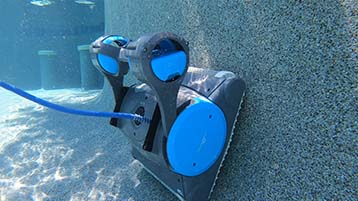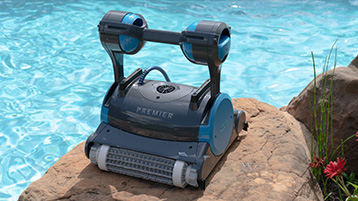Poolside
Advice, how-to's, tips & tricks, and everything pool related.

What is a Salt Water Pool?
How does a saltwater pool work?
TweetFirst introduced in the 1970s, salt water pools have grown in popularity as an alternative to traditionally chlorinated pools. Modern pool owners are making the switch to salt water pools because of the many advantages that come with one, like smoother water, fewer chemicals, and cheaper upkeep, to name a few. But to get a more thorough understanding of what a salt water pool is, we’ll dive into how it works exactly, and what it means for you as both a pool owner and user.
How Is a Salt Water Pool Different from a Chlorinated Pool?
Curveball alert: they’re very similar. As in, they both use chlorine to clean pool water.
Wait, what? Yes. Both salt water pools and chlorinated pools use chlorine to oxidize bacteria, algae, and whatever else might flourish in pool water. The difference, however, is how the chlorine makes its way into the water.
With a chlorinated pool, you have to manually add chlorine, either in the form of powder, tablets, or liquid. The mixture of the chlorine additive with water creates the holy grail of pool cleanliness: hypochlorous acid. That’s what kills the nasty stuff and keeps your pool from turning murky green.
A salt water pool still uses hypochlorous acid, or what we loosely refer to as chlorine, to clean a pool. There’s just a little more hands-off chemistry taking place than meets the eye.
How a Salt Water Pool Works
The functionality of a salt water pool lies with one important piece of equipment: a salt chlorine generator.
It all starts by adding salt to your pool. And we’re not talking ocean-level saltiness. Salt water pools have about 1/10 the salinity of the ocean. It’s comparable to a mild saline solution, like tears or what you use as contact lens solution. The salt used in salt water pools can be the same as what you’d find in the salt shaker on your table, good old NaCl – sodium chloride. So, when you have a salt water pool, you’re pouring in old-fashioned bags of salt. Choose salt with 99% purity or higher if possible. You can find inexpensive bulk options at any home supply store.
Once the salt is added to the water, it passes through the salt chlorine generator. This is where some impressive chemistry action goes down. Before the salt water passes through the generator, it is simply salt and water (NaCl and H20). But the generator itself is made of a series of metallic grids that have a low-voltage current. Through electrolysis, the cell creates a reaction that converts the salt into pure, gaseous chlorine (CI2).
Those tiny bubbles of pure chlorine are then released back into the pool to combine with the water, creating – you guessed it – hypochlorous acid (HOCl). Or pool chlorine. And that’s the stuff that keeps the nasty bacteria and grime at bay.
And that’s it. Instead of dumping in pounds of harsh chemicals all year to chlorinate your pool, a salt water pool uses electrolysis and natural materials to oxidize the water and keep it crystal clear.
Maintaining a Salt Water Pool
The low-maintenance nature of salt water pools is one of the reasons they are so popular. Although you do need to monitor pH levels to make sure they don’t rise too high, the salt water pool virtually cleans itself. And because salt water pools don’t require an added chemical stabilizer to offset the harshness of the chlorine, algae doesn’t grow quite as rapidly.
Cost
The higher initial expense is what turns some people away from converting to a salt water pool. Adding the generator can cost anywhere from $700 - $2,000, depending on where you buy it and who installs it. Most generators will last 3-7 years.
However, the month-to-month cost of owning a salt water pool is far cheaper than that of a chlorinated one. Salt costs about $0.18 a pound, while pool chlorine tabs cost about $2.17 a pound. While the up-front cost may be high, the long-term savings often make that initial investment worth it.
Benefits of a Salt Water Pool
Natural Option
In the age of all-natural products and environmental friendliness, salt water pools are a winning choice. The salt chlorine generator frees pool owners from having to handle toxic chemicals regularly. Best of all, it keeps that pesky chlorine smell at bay. Salt water pool users won’t find their hair turning green, their swimsuits fading, or their eyes aggravated by the harshness of traditional pool chlorine that has added chemicals.
Softer, Silkier Water
The salt in a salt water pool creates water that feels silky smooth. Think of a chlorinated pool and the harsh, hard feeling of the water. Now think of the softer, smoother water from a stream or river. The water in a salt water pool is much closer in texture and feel to the natural bodies of water than a chlorinated pool. That comfort lends itself to longer, more enjoyable pool days.
Annually Cheaper
Once you’ve made the initial purchase of the salt chlorine generator, your annual maintenance cost goes down dramatically. With pool chlorine costing an average of 12 times more than pool salt, you’ll be surprised at how those savings add up with each passing month.
Disadvantages of a Salt Water Pool
Costly Start-Up The salt chlorine generator can be pricey, especially if you purchase it from a specialty store and have it installed professionally. But remember, you will likely see a return on that investment because of the low regular maintenance costs.
Special Maintenance
If your salt water pool does need irregular maintenance, like if a part breaks and you need to replace it, you may find it to be more expensive than you’d like. Because salt water pools are more complex than traditionally chlorinated ones, parts tend to be pricier.
Can Be Abrasive
Salt is corrosive and erodes many materials. It can be abrasive to metal and even improperly sealed stone. But because the saline concentration is so low, it would take a lot of improper maintenance to really damage those materials.
Is a Salt Water Pool for You?
Salt water pools are growing in popularity for a reason. The smooth, silky swimming experience without the eye-watering chlorine smell is enough reason for many pool owners to make the switch. Plus, lower maintenance is always plus when it comes to caring for a pool.
But like any pool, salt water pools don’t like to be ignored. You still have to stay on top of the chemistry and maintenance in order to enjoy the mildly salty benefits of a salt water pool.
Ultimately, salt water pools create a more pleasant swimming experience thanks to technology and methods that’ll only become easier and more refined with time. That’s a movement toward modern pool ownership we can get on board with.
Want to learn how to take care of your pool?
Find top how-to's, guides, and more about taking care of your swimming pool.
Read More Pool Tips


